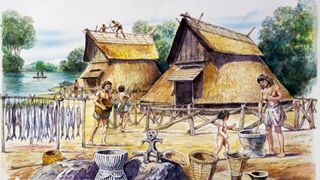Ancient hunter-gatherer DNA associated with high BMI in modern Japanese
Some Japanese people today may have a high body mass index, or BMIbecause of the DNA they inherited from prehistoric hunters.
In a new study, researchers analyzed the genomes of more than 170,000 people living in Japan, from Hokkaido in the northeast to Okinawa in the southwest, and compared this modern DNA with the genomes of 22 Japanese and Eurasian prehistory from abroad. pre-structured dataset.
In particular, the researchers examined how DNA was inherited from the Jōmon people, a traditional group of fishermen who lived in Japan. up to 16,500 years agocan be attributed to 80 different complex characteristics in modern Japanese people. Complex traits are those encoded by multiple genes and include traits such as height, BMI and the amount of oxygen-carrying cells in the blood.
Scientists have found that, on average, Japanese people have inherited about 12.5% of their DNA from Jōmon hunters. Of all the traits studied, BMI was the only trait that was significantly associated with Jōmon DNA – meaning that people with more genetic evidence of Jōmon ancestry were more likely to have a higher BMI. than those who had less prehistoric DNA.
Therefore, this DNA can put people who carry it at high risk of thicknessthe researchers wrote in the paper.
Related: Papua New Guineans, genetically separated for 50,000 years, have Denisovan genes that help their immune system.
BMI is an imperfect measure of body fatpartly because it doesn’t distinguish between fat and thin bodies. It’s also based on data from white people, so the health effects don’t always generalize to other populations. However, a high BMI is linked to various health risks, such as type 2 diabetesand metric is still widely used in medicine.
As well as examining DNA from Japanese people, in separate analyses, the researchers focused on people with Japanese ancestry living in other countries, including 2,200 East Asians living in the UK. these showed similar relationships between Jōmon ancestry and BMI, which emphasized long reach. effects of this gene.
The researchers described these findings in a paper published Nov. 12 in the newspaper Nature Communication. They said that education is a sign of natural selection – the motivational force of organisms to evolve over time. What may have been a positive trait in the past may negatively affect disease risk today, they concluded.

“It is a very important discovery that ancient generations of hunters may have played an important role in the lives of modern people,” learns one author. Shigeki Nakagomeassociate professor of genomic medicine at Trinity College Dublin, said a statement. “The association with increased BMI may also help explain the large disparity in obesity among Asians living in Western countries.”
The researchers found that the Jōmon genes were highly active in skeletal muscle cells, which cause voluntary movements. Some of these genes have previously been linked to higher BMI. The team suggested that this DNA may have helped prehistoric hunters adapt to high physical demands of their lifestyle.
Previous research also showed that several of the Jōmon genes can increase bone mineral density, or the concentration of calcium and other minerals in the bones. This is an indication of what a person does high levels of physical activity. Having larger muscles and thicker bones can upset a person’s BMI.
The new study also provides some evidence to support the concept of population genetics.
For about thirty yearsmany scientists are of the opinion that the Japanese of today are descended from two groups of ancestors: the Jōmon hunter-gatherers and immigrants from Northeast Asia. However, the latest evidenceincluding data from this new study, begins to turn this theory on its head, suggesting that a third group of ancestors from East Asia also left their genes to humans today the Japanese.
“I am sure there is much more to discover, both for Japanese citizens and for others around the world,” Nakagome said in the statement.
Always ask yourself why some people build muscle more easily than others or why spots appear in the sun? Send us your questions about how the human body works community@livescience.com with the subject “Health Desk Q,” and you can see your question answered on the website!
#Ancient #huntergatherer #DNA #high #BMI #modern #Japanese